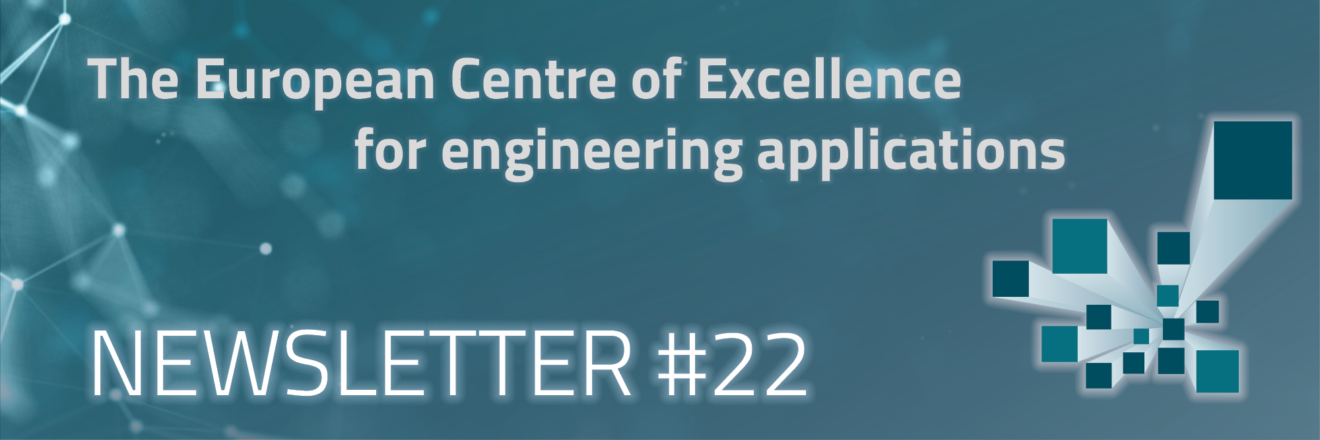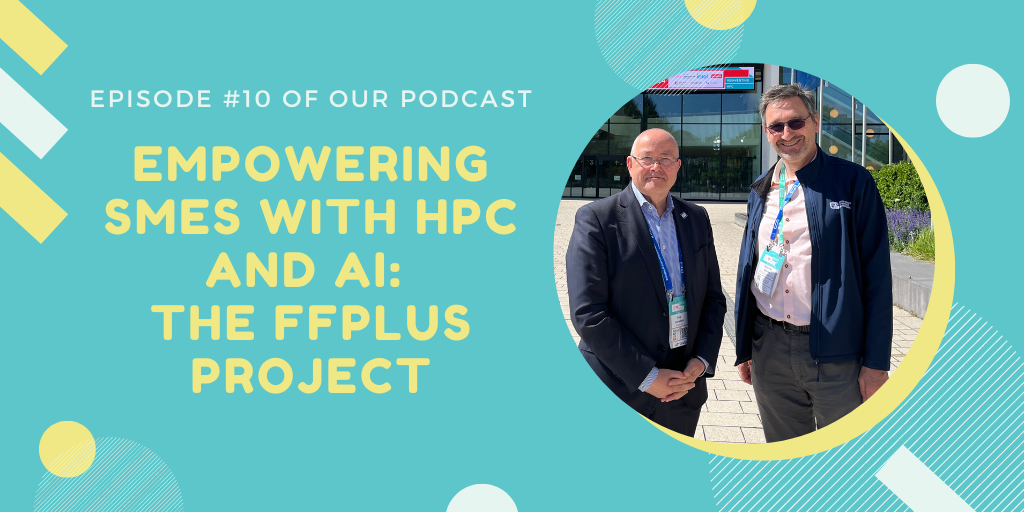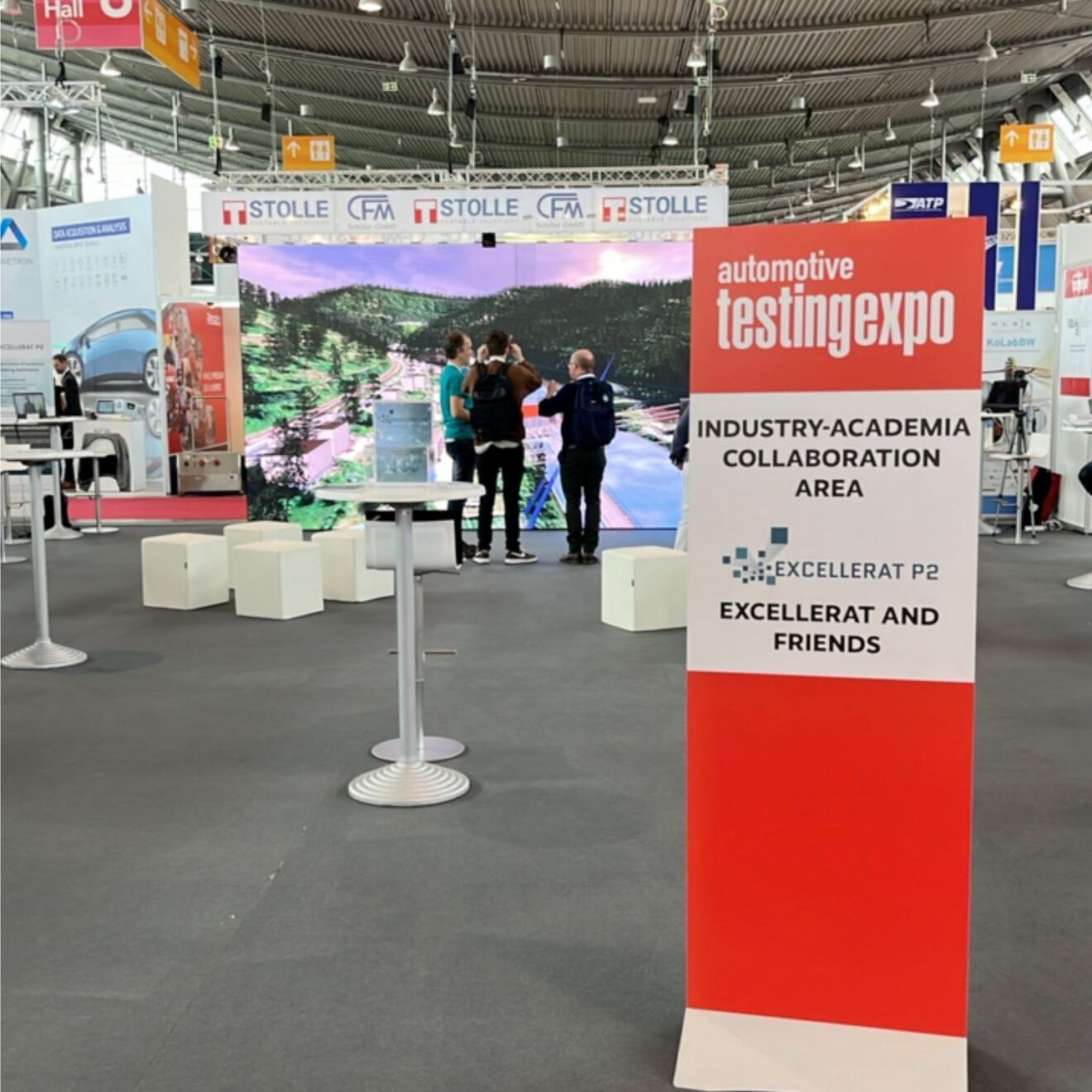|
|
|
|

|
Content
|
2. Podcast: Empowering SMEs with HPC and AI: The FFplus Project
|
3. Blog article: Industry-Academia Collaboration at Automotive Testing Expo
|
|
4. Blog article: EXCELLERAT P2 Shines at ISC24
|
|
|
|
|
|
1. Welcome
|
Welcome to the 22nd issue of the EXCELLERAT newsletter!
|
We have some exciting updates to share with you. In the tenth episode of our HPC Podcast, Dr. Guy Lonsdale, CEO of scapos, discusses the FFplus project, which aims to help SMEs by providing access to high-performance computing (HPC) and artificial intelligence (AI). He addresses the main challenges SMEs face and how FFplus overcomes them, promoting business benefits and building on the successes of previous Fortissimo projects. Tune in to learn more about the open calls for business experiments and innovation studies.
|
Our team recently attended the Automotive Testing Expo, where we explored the benefits of industry-academia collaboration. You can find a detailed account of our experiences and insights in our latest blog article.
|
At ISC24, we presented some of EXCELLERAT P2’s latest advancements. Our blog provides a thorough recap of the event and our contributions to the HPC community.
|
Looking ahead, we have several events and training courses planned, offering more opportunities for engagement and learning within the HPC field.
|
Thank you for following our progress.
|
|
EXCELLERAT P2 Project Coordinator
|
|
|
|
2. Podcast: Empowering SMEs with HPC and AI: The FFplus Project
|

|
|
In the tenth episode of the HPC Podcast powered by EXCELLERAT, we speak with Dr. Guy Lonsdale, CEO of scapos, about the FFplus project. This initiative aims to help small and medium-sized enterprises (SMEs) by providing access to high-performance computing (HPC) and artificial intelligence (AI), focusing on sectors like manufacturing and engineering. Guy discusses the main challenges SMEs face in adopting these technologies and how FFplus works to overcome them. We also explore how the project engages new HPC users, promotes business benefits, and builds on the successes of previous Fortissimo projects. Tune in to learn about the open calls for business experiments and innovation studies, and the potential impact on European SMEs.
|
|
3. Blog article: Industry-Academia Collaboration at Automotive Testing Expo
|

|
|
The Automotive Testing Expo Europe took place on June 4-6 in Stuttgart, featuring a new Industry-Academia Collaboration Area initiated by EXCELLERAT. This zone was designed to foster connections between the automotive industry and academic institutions, aiming to boost market competitiveness and highlight emerging talent. The goal was to encourage collaborations that drive innovation and progress. Learn more about this activity in a recent blog article.
|
|
4. Blog article: EXCELLERAT P2 Shines at ISC24
|
|
From 12-16 May in Hamburg, ISC High Performance 2024 brought together more than 3,000 attendees from 51 countries, focusing on HPC, AI, and Quantum Computing. As reported in a blog article in more detail, highlights included Sophia Honisch (HLRS) introducing EXCELLERAT P2, showcasing HPC solutions for engineering challenges, and Dennis Grieger (HLRS) presenting advancements in in-situ visualization at WOIV’24.
|
|
|
|
5. Further news & events
|
|
|
|
|
|
School on Computational Fluid Dynamics and SuperComputing
|
The School on Computational Fluid Dynamics and SuperComputing will cover state-of-the-art CFD research and industrial codes running on HPC clusters. Participants will explore solving nonlinear PDEs in fluid dynamics with advanced algorithms and efficient parallel implementation. Sessions include lectures and hands-on tutorials on parallelization strategies (MPI, OpenMPI), graphic accelerators, and numerical libraries. Experts M. Bernardini and F. Salvadore will lead hands-on sessions on high-speed flows and performance portability.
|
|
MS4: Modernizing CFD: Exploring CI/CD for Improved Software Development Life Cycle
|
Co-organised by the European Centers of Excellence CEEC, EXCELLERAT P2, EoCoE3, and HiDALGO2, and supported by CASTIEL 2, this mini-symposium will focus on modernising Computational Fluid Dynamics (CFD) through Continuous Integration/Continuous Deployment (CI/CD). Attendees will explore how CI/CD enhances stability, reproducibility, portability, and performance in CFD applications. The event will cover innovative approaches across the CI/CD pipeline stages, contributing significantly to CFD's scientific advancements. The symposium will be held at Universitätsclub Bonn, featuring EXCELLERAT partner Dennis Hoppe from HLRS.
|
|
FFplus Open Call for Business Experiments and Innovation Studies launched!
|
The first FFplus Open Call for Business Experiments and Innovation Studies was just launched, aiming at promoting the adoption of HPC and AI by SMEs and start-ups across Europe. This initiative offers opportunities for SMEs to tackle business challenges through HPC and for those already using generative AI to scale up with additional computational resources. The submission deadline is September 4th, 2024: https://www.ffplus-project.eu/
|
|
Self-paced course: Approaches to analysing time-series data
|
|
Tourist destination managers, service providers, and researchers want to better understand traffic flows: what impact traffic flows have, when do traffic peaks occur, what are the seasonal effects, which areas are more / less congested with tourists, how do weather, holidays and other events affect this behaviour. With the help of data analysis and forecasts, they can prepare for periods of increased visitors, as well as adjust marketing activities, service offerings, or resource allocations. In this tutorial we look at a real-world dataset consisting of traffic counters on Slovenian roads, provided by the Slovenian Road Network (DARS), and its application to the questions above. Get access to the tutorial through our Service Portal.
|
|

|
|
Funded by the European Union. This work has received funding from the European High Performance Computing Joint Undertaking (JU) and Germany, Italy, Slovenia, Spain, Sweden, and France under grant agreement No 101092621.
|
Höchstleistungsrechenzentrum Stuttgart (HLRS) | Nobelstraße 19
|
|
70569 Stuttgart | Germany
|
|
|
|
|
|
|